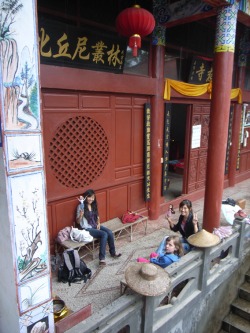
Freda, Magda & Roise, Longtang Temple.
BAOSHAN - CHANGNING
It wouldn't seem right visiting a town without also finding its temple. Magda and Roise, two of the graduates we visited in Changning (2 hours from Baoshan by bus), were delighted to take us to Longtang Si, 10km out of town. Both of them had visited the temple before, Roise's last visit being only a few weeks before, when she prayed for success in her teaching exam. Although Magda and Roise were excellent students and did very well in their PIE teaching practice (2 months in rural schools), they failed to make the grades in the County teaching exams. They have both been working as teaching assistants - same work as teachers for a fraction of the pay (400-600RMB a month) - and are now looking to get a better job.
Becoming a teacher here is a bit like joining the army. Once registered with a local Education Bureau (usually their home town) they are at the mercy of leaders. Having passed her exam this time round (the prayers worked), I received a message from Roise saying that she had been posted to a small village several hours from Changning. They have no control over where they end up working, though a bit of guangxi (a complex concept that involves 'relations', 'contacts', 'favour') can improve one's chances of a favourable posting. There are ways to move between counties but it's a convoluted process that involves re-taking exams and pre-empting what the outcomes might be. It's much easier to stay at home.
It wouldn't seem right visiting a town without also finding its temple. Magda and Roise, two of the graduates we visited in Changning (2 hours from Baoshan by bus), were delighted to take us to Longtang Si, 10km out of town. Both of them had visited the temple before, Roise's last visit being only a few weeks before, when she prayed for success in her teaching exam. Although Magda and Roise were excellent students and did very well in their PIE teaching practice (2 months in rural schools), they failed to make the grades in the County teaching exams. They have both been working as teaching assistants - same work as teachers for a fraction of the pay (400-600RMB a month) - and are now looking to get a better job.
Becoming a teacher here is a bit like joining the army. Once registered with a local Education Bureau (usually their home town) they are at the mercy of leaders. Having passed her exam this time round (the prayers worked), I received a message from Roise saying that she had been posted to a small village several hours from Changning. They have no control over where they end up working, though a bit of guangxi (a complex concept that involves 'relations', 'contacts', 'favour') can improve one's chances of a favourable posting. There are ways to move between counties but it's a convoluted process that involves re-taking exams and pre-empting what the outcomes might be. It's much easier to stay at home.
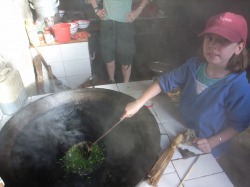
Freda preparing a tofu dish for dinner.
JIUJIA VILLAGE
One of the highlights of our time in Changning was a visit to Jiujia village, where Magda is currently living with her boyfriend and his family. We bought lots of vegetables in Changning market and took over the farmhouse kitchen to prepare dinner. Our contributions consisted of lemon cucumber salad, baked aubergine and Freda's ma po doufu (tofu, tomato and herbs). Cooking in a giant wok, solid fuel (logs burning underneath) beats our tiny, ceramic hot plate in Simao. When all the dishes were ready we ate outside, at a small table in the courtyard. With our afternoon stroll around the village and country kitchen experience, this was a very memorable day.
One of the highlights of our time in Changning was a visit to Jiujia village, where Magda is currently living with her boyfriend and his family. We bought lots of vegetables in Changning market and took over the farmhouse kitchen to prepare dinner. Our contributions consisted of lemon cucumber salad, baked aubergine and Freda's ma po doufu (tofu, tomato and herbs). Cooking in a giant wok, solid fuel (logs burning underneath) beats our tiny, ceramic hot plate in Simao. When all the dishes were ready we ate outside, at a small table in the courtyard. With our afternoon stroll around the village and country kitchen experience, this was a very memorable day.
On our exploration of the village we met these local women who were on their way home after a day of foraging. Their baskets were empty but they were in good spirits, especially after our chat, which covered the usual - age, nationality, salary (in that order). The markets have a lot of wild mushrooms for sale these days but there are a lot of people competing for this valuable source of income. Better luck next time ladies!
Magda [front right] gets along well with her soon-to-be mother-in-law [back left, behind Roise], sharing the tasks of cooking and cleaning. Traditionally girls have been considered a burden to Chinese families, particulary if money is short. This isn't because of sexist misconceptions that women can't work as hard. On the contrary, Chinese women seem to be the backbone of the economy and keep many a family afloat while the men keep their brains afloat, with bai jiu (rice brandy). The main sense of burden comes from the fact that, traditionally, girls are brought up to be 'married out' to another family. They are cared for, educated and then sent off with a dowry to care for a husband and all his relatives. Young women often found themselves 'married in' to a family that treated them as a slave. What's more, if they didn't produce a son within 9 months of being married, they'd find themselves replaced with 2nd, 3rd or 4th wives and concubines. Although much of this has changed, it's still common for newlyweds in the countryside to live with one of their families, to help take care of their ageing parents and take over the farm.
Magda is delighted to have found in-laws who respect her. We also enjoyed getting to know her new family. Magda and her boyfriend hope to get married some time in the next year. Freda and Edie have already been asked to be bridesmaids, if we are still in China.
Magda is delighted to have found in-laws who respect her. We also enjoyed getting to know her new family. Magda and her boyfriend hope to get married some time in the next year. Freda and Edie have already been asked to be bridesmaids, if we are still in China.
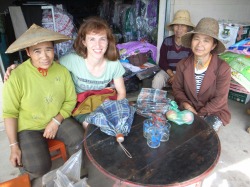
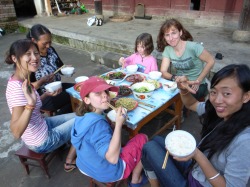
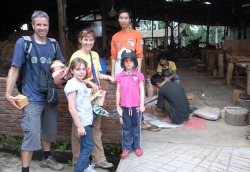
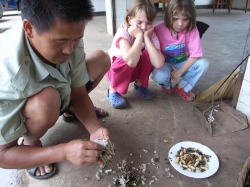
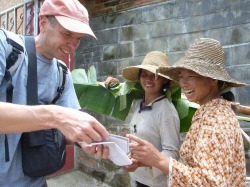




 RSS Feed
RSS Feed